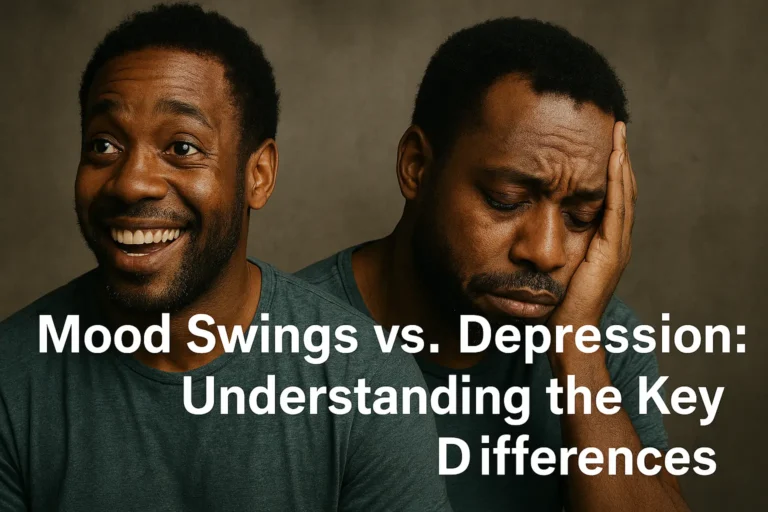Mood Swings vs. Depression: How to Tell the Difference
Clear Answers from GloFusion in Griffin, GA
We all have ups and downs—days when we feel energized and others when we feel low. But how do you know when it’s just a passing mood swing and when it might be something more serious, like depression?
At GloFusion, we help people untangle the confusion between everyday emotional changes and clinical depression. This guide will help you understand the key differences, so you can take the right steps for your mental well-being or help someone else who may be struggling.

Page Contents
What Are Mood Swings?
Mood swings are temporary changes in emotional state that can shift from happiness to irritability or sadness and back again. They are often linked to life events, stress, hormones, or fatigue, and are common in everyone to some degree.
Key traits of mood swings:
🌀 Short-term changes in emotion, often triggered by external factors
💬 Self-resolving—usually return to baseline without intervention
😡 May be tied to specific events or conflicts
🕒 Typically last minutes to hours, not days
🌿 Often manageable with lifestyle changes like sleep or stress relief (Cleveland Clinic)
Mood swings are common, but if they become frequent and disruptive, it may signal a deeper issue like bipolar disorder or chronic stress.
How Depression Is Different
Unlike mood swings, depression is a clinical condition that involves persistent sadness, loss of interest, and physical or emotional symptoms that don’t go away on their own.
Signs of clinical depression:
📉 Sadness or emptiness lasting two weeks or more
🥱 Fatigue, low energy, or sleeping too much/little
😞 Hopelessness, guilt, or feelings of worthlessness
🚫 Loss of interest in activities once enjoyed
🍽️ Changes in appetite or weight
💭 Thoughts of death or suicide (National Institute of Mental Health)
Depression can affect relationships, work, and everyday life, and usually requires professional treatment to improve.
Why People Confuse the Two
Because mood swings and depression both involve emotional changes, they’re easy to confuse. Plus, social stigma and lack of awareness can lead people to minimize symptoms or delay seeking help.
Reasons for confusion include:
🤔 Both involve sadness or irritability
🧠 Depression can appear with “good days,” masking the depth of struggle
💡 Mood swings in some disorders (like bipolar) include depressive episodes
🗣 People may downplay symptoms, calling it just a “bad mood”
📅 Hormonal shifts (e.g., PMS, postpartum) can blur the line
At GloFusion, we provide careful evaluations to ensure that you or your loved one gets the right diagnosis and treatment plan.

When to Seek Help—and What to Expect
If you or someone you know experiences prolonged sadness, changes in functioning, or difficulty coping, it’s time to talk to a mental health provider. Early support makes recovery easier and more effective.
Seek help if you notice:
🚩 Emotional lows lasting two weeks or more
🚩 Sudden withdrawal from friends or responsibilities
🚩 Sleep or appetite changes impacting health
🚩 Increased irritability, anxiety, or fatigue
🚩 Suicidal thoughts or feelings of hopelessness
At GloFusion in Griffin, GA, our compassionate team offers comprehensive evaluations and tailored treatment options, including therapy, medication management, and lifestyle support.
Conclusion: Knowing the Difference Can Change Lives
Recognizing the difference between mood swings and depression isn’t just about naming the problem—it’s about finding the right solution. Whether you need a listening ear, a diagnosis, or a new approach to mental health, we’re here to help you feel more like yourself again.
👉 Think it might be more than a mood swing? Contact GloFusion today for a confidential consultation.

